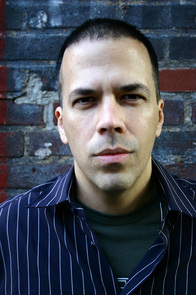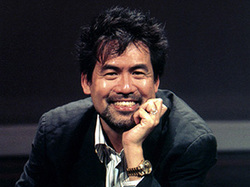 As I mentioned in yesterday's post, I reached out to my friend and fellow playwright, Kia Corthron to see if she would contribute to my ongoing blog series about Diversity and Inclusion, which can be read here and here. She was excited about the series and wanted to share an article that she had written for the Dramatist Guild's The Dramatist magazine called, The Ethics of Ethnic, which brilliantly addresses the issue of artistic authority. In it, Kia asks colleagues to participate because she felt "there were as many different answers to my questions about artistic authority as there were playwrights." In Part Two of the Artistic Authority Blog Series, we will be hearing from playwrights Jorge Ignacio Cortiñas, Kristoffer Diaz, Marcus Gardley, Daniel Goldfarb, Karen Hartman, David Henry Hwang, Sunil Kuruvilla, Young Jean Lee, Qui Nguyen, and Marsha Norman. Remember, this article was originally printed in the Sept/Oct 2010 issue of The Dramatist, the journal of the Dramatist Guild of America, Inc. We have the great fortune to read it here with their permission and with the permission of the featured playwrights.  JORGE IGNACIO CORTIÑAS I'll share something: Among the playwrights-of-color that I know, there are many, myself included, who go to the theater expecting to be offended. When we see an immigrant's accent mined for humor, when we see a character's dark skin imagined as inherently dangerous or fetishized as sexually taboo, when the countries our parents immigrated from are treated as two-dimensional metaphors for the chaotic or corrupt, when we are asked to identify with characters-of-color who are grudgingly afforded the backhanded compliment of being (inherently and inexorably) more in touch with nature, we are never surprised but almost always stung. I'm not inclined to tell any playwright what they should or shouldn't write. But we need to continue to press for a national theater in which the staff and seasons of our producing organizations bear a more reasonable resemblance to the demographics of the cities they are located in. When that happens, I think we'll start seeing such a dizzying array of characters, in such new and unfamiliar plays, that the old tropes will start to appear more and more ridiculous. And they'll sting less. Maybe then we'll finally begin to glimpse what artistic freedom actually looks like. Jorge Ignacio Cortiñas's play Blind Mouth Singing was produced by the National Asian American Theater Company using an all-Asian cast. That play then went on to be produced by the Compañía Teatral Rita Montaner in Havana, the first time a Cuban theater company produced a play by a Cuban-American playwright. Jorge teaches playwriting at Lehigh University which is located in Bethlehem, Pennsylvania. Recently Jorge and a group of playwrights joined forces to found Fulcrum Theater (fulcrumtheater.org).  KRISTOFFER DIAZ I think playwrights can write about anything they want, provided that we do the work to handle the topics with care and sensitivity. All of my plays contain characters outside of my ethnicity, because that's a reflection of the world in which I live. Whatever the ethnicity of the character, my ground rule is simple: don't define that character by his/her ethnicity. There's a whole lot more to a person's identity than where his/her family is from. I've seen a number of plays where people of color (not just Puerto Ricans or Latinos) are wholly defined by their race or ethnicity. That's a problem. It's a larger problem when even that small portion of their identity is presented in an overly simplistic fashion. There is something interesting about being Black (or brown) in a white world, but it's rare to see that explored. We more often see a token character of color whose inner life goes unexplored. One of the characters in The Elaborate Entrance of Chad Deity is a white businessman who is only interested in his company's bottom line. I've heard from some audience members (and an actor or two) that this character is a bit of a cartoon. My initial response to that charge is...well yeah. The play itself is kind of a cartoon. But I'm also mocking certain attitudes and ideas that I've experienced in American culture (and in the American theater, at that), one of which is the easy way that many citizens of the United States form stereotypical decisions of other cultures. It's all kind of meta, which sounds obnoxious, I know, but it at least shows that I've been giving a lot of thought to this topic, and ultimately, that's all I ask from others. One last thing: as a person of color in the United States, I'm confronted by mainstream culture every day. An overwhelming amount of that culture is white, moneyed, and/or religious. I'm not really any of those things, but I'm constantly exposed to them, so to me, there's not really a question of if I'm qualified to write about them. The same isn't true in the other direction though. If a non-Latino writer has something to say about some portion of Latino culture, I'm expecting them to both do their research and prove to me that they have done that research. Kristoffer Diaz is a playwright and educator living and working in Brooklyn. Full-length titles include The Elaborate Entrance of Chad Deity, Welcome to Arroyo’s, Guernica, and #therevolution. Awards: 2011 New York Times Outstanding Playwright Award; finalist for the 2010 Pulitzer Prize for Drama; winner, 2011 Lucille Lortel Award for Outstanding Play; winner, 2011 OBIE Award, Best New American Play; and the inaugural Gail Merrifield Papp Fellowship from The Public Theater (2011).He lives in Brooklyn, New York.  MARCUS GARDLEY I believe that playwrights should feel comfortable writing outside of their own ethnicity. As with any character, playwrights should do proper research or have ample knowledge about the character's background. I don't think there are a set of ground rules but I find that complex characters who break or transcend stereotypes draw me in. I have had both positive and negative experiences watching the work of playwrights from various backgrounds who have written characters with my same ethnicity. I have appreciated those who have told the truth and have been disappointed by work in which the characters were treated like carbon cut outs. I think most writers seek to tell the truth, the problem is that everyone's truth is not always the same. However, there is such a thing as pure ignorance or a disrespect for a culture which is where obvious non-truths arise. For example, I recently saw a play where a number of black characters were stereotypes for the sake of comedy. The characters did not struggle to break their stereotypes, there was nothing informative or complex about the fact that they were stereotypes – they were funny because they were made fun of. Only the white characters had any agency or made any change over time. And the play was celebrated! I think that American media culture has had a long history with black stereotypes that have evolved from minstrel shows and you rarely find any African-American comedic plays on stage because white America still does not understand or is uninterested in humor that honors black culture and breaks stereotypes. The last play that did this was The Colored Museum by George C. Wolfe. I have never been criticized for writing outside my ethnicity - at least not to my face. I think most people call my plays black plays and I am fine with that because I write in what I call an African-American aesthetic. I am proud of my voice which is distinctly black and I think that culture and difference should be celebrated. I realize that calling myself a black writer who writes black plays puts me in a certain box but I don't think that you can make art in this country and not be categorized. People will always put an artist in a box because that is the only way they call sell, buy or explain your work to the masses. So I don't mind being put in a box as long as I can decorate the box or jump in another box anytime my current box gets too cramped. And it is the decorating of my boxes that defines my aesthetic. My work is rooted in traditional black storytelling: it is not linear, it thrives on innovation and improvisation, it is soulful and spiritual and mythic, and finally it allows for the audience to have a sweet release, which is to say it wants to give people a cathartic finish that is as profound as the holy ghost in a black church. I write big plays like the Greeks and Egyptians and my work thrives in front of audiences who are interactive, and alive! Poet-Playwright Marcus Gardley's new play Every Tongue Confess will premiere at Arena Stage in the fall. His recent play On The Levee opened at LCT3 in July. He lives in Brooklyn, New York.  DANIEL GOLDFARB I do believe playwrights have the authority to write outside of their own ethnicity. But at the same time, I feel that writing from within your ethnic identity automatically gives your work a context, a depth, a knowingness. When something is in your bones, you can recognize it for everything it is in all its complexity and that usually shows in the writing. The worst kind of writing is when you can feel the research in the pages. When writing outside your own ethnicity, it’s more important than ever to make sure you can connect with your characters in a personal way. Your voice needs to shine through any story you are telling. There are lots of traps that are easy to fall into – you don’t want your work to feel earnest, inauthentic, insensitive, oversensitive, broad, false, wooden, or ignorant. Daniel Goldfarb’s plays and musicals include The Retributionists (Playwrights Horizons); Sarah, Sarah (MTC); Modern Orthodox (Dodger Stages); Adam Baum and the Jew Movie (Blue Light); Radio Girl (Goodspeed); MartinShort: Fame Becomes Me (Broadway); and Party Come Here (WTF). He lives in New York City.  KAREN HARTMAN Tricky as it is to assume authority to write about people of other races, the alternative seems much worse: to people plays solely with characters of the writer’s own ethnicity. I suppose we draw the authority to write across race in the same way that we leap gender, age, or time period – compassion and research. When I set out to write Goliath, a play about secular Jewish soldiers evacuating Orthodox settlers from the Gaza Strip, I knew there had to be at least one Palestinian voice. It was poetic license even to have a Palestinian character in Gaza (in reality they were barred from the area two weeks before the pullout), but to have the conversation only among Jews would be too insular. I also wanted to address the economics of the transition, so I created Ayat, the longstanding employee and friend of a Jewish greenhouse owner, Gittel, who is about to be evacuated. Ayat stands to inherit the business directly if the women can make a deal that will hold up in the legal quicksand of the changing regime. Also, because Goliath grew out of my discomfort with Israel/Palestine as an issue that divides the left in this country, and specifically splits along racial lines, I made the most fervently Zionist soldier an Ethiopian Jewish immigrant. I wanted to explore the fact that half of Israeli Jews are of Middle Eastern or African descent. And, as a white Jewish writer, I wanted to avoid a cast dynamic where the one Palestinian character would also be the only actor of color. I think it’s easier to get away with writing across racial lines when the context is international, lowering the probability that the writer will be stepping on the performer’s direct experience. But for me the reality check is always: Who will play this part? Will he or she be proud to play it? Will I be proud to be there when they do? Karen Hartman’s play Goldie, Max & Milk will have a National New Play Network rolling world premiere next season, with productions at Florida Stage, A Traveling Jewish Theater, and the Phoenix Theater. She lives in Brooklyn, New York.  DAVID HENRY HWANG I absolutely believe that playwrights have the authority to write outside of their own ethnicity. Writers should not be surprised, though, if such stories receive particular scrutiny and even criticism from people of that ethnicity, who will have a greater investment in how they are portrayed than will the general public. Playwrights have the right to write about anything they want; people who don't like the result, however, also have the right to complain as loudly as they want. I can think of several works featuring Asian characters written by non-Asians which have impressed and moved me; in these cases, I feel the authors really did their homework. For instance, I've always loved Sondheim & Weidman's Pacific Overtures. Conversely, there are many pieces by non-Asians to which I've had a negative reaction; M. Butterfly was in part my reaction to Puccini's Madama Butterfly. Given my feelings about Madama Butterfly, it is unsurprising that I also reacted negatively to Miss Saigon, which, in my view, recycled the Butterfly Trope with neither irony nor critical perspective. I've never been criticized for writing outside my own ethnicity. If anything, I am more likely to be criticized when I write within my ethnicity, by other Asians or Asian Americans. As members of a group whose stories are rarely told in mainstream arts and media, Asians of course end up having a greater investment in seeing that they are portrayed "authentically." The problem is that no ethnic group is monolithic; therefore, no single writer can represent an entire community, only a community of writers can do that. David Henry Hwang's theatrical work includes M. Butterfly, Yellow Face, Golden Child, and FOB, as well as the Broadway musicals Aida (co-author), Flower Drum Song (revival), and Disney’s Tarzan. He lives in Brooklyn, New York.  SUNIL KURUVILLA I need to be distant: I write better about a place I know when I get away from it - the only time I can really write about my hometown is when I’m traveling – and things go best when I’m writing about places unfamiliar to me. I wrote a play about an Indian boy growing up in Canada and a play about three Welsh women and their associations with a boxer. Acquaintances who have seen the play about the Indian kid think he’s me. But I feel that the play about the Welsh women is more autobiographical as the characters reveal problems I was having at the time of its writing, and I’ve always worried that close friends will discover me if they see that play. I think that Welsh play is better than the one set in Canada. I was able to write about Wales, a country I’ve never visited, more deeply than I ever have about Canada, the one I live in, because, paradoxically, I was less in the way. When writing about a culture that isn’t my own, I overcome my insecurity by researching. But when writing about a place I know, I’m too comfortable, and spend my time looking for clever metaphors. Ultimately, they don’t work because I’m lacking the details required to make them, and the story itself, feel real. Sunil Kuruvilla's plays, including Fighting Words and Rice Boy, have been produced at Yale Rep, the Mark Taper Forum, the Stratford Shakespeare Festival and elsewhere, and he is currently commissioned by South Coast Rep. Sunil lives in Waterloo, Ontario, Canada, with his wife Lisa and son Isaac.  YOUNG JEAN LEE How many not-of-your-own-ethnicity characters can you have before you are considered to be writing outside of your own ethnicity? I don’t think anyone would argue that white playwrights should only write plays with all-white casts, or that people of color have to only write about their own ethnicity. In the case of my show The Shipment, all the cast members were black and the show was specifically about black identity, so I was clearly writing outside of my own ethnicity, but I never felt I had the “authority” to do it. I asked the actors what they wanted to say about racism and what kind of show they wanted to perform in, and then I wrote something in accordance with their specifications. They had final approval on whatever ended up in the show. I would do the same if I wrote a play about white identity. Thomas Bradshaw, a black playwright, has written some Asian female characters whom I love. I’m always thrilled when Asians show up in his plays. It feels like an honor. I think there was one person who said I was exploiting black people in The Shipment, but he hadn’t seen the show. I don’t see how making a show to the requested specifications of your black actors is exploitative, but if someone can make a good case for it then I’m open to the critique. Young Jean Lee is the Obie Award-winning artistic director of Young Jean Lee’s Theater Company. She lives in Brooklyn, New York.  QUI NGUYEN I don’t write about my “race” too often and I realize this is something that can be pretty darn confounding to some artistic directors. A lot of them want me to fit neatly in some sort of exotic immigrant box where all my plays are in Vietnamese meditating on the homeland, rice fields, and the hardships of communism. Which I would love to be able to do, but unfortunately I was born in southern Arkansas where there’s a severe lack of rice fields and communists. And though I do speak some Vietnamese, it’s at a very elementary level. Extremely elementary. I mean I can’t even form a sentence in first person. It’s literally “Qui says hello. Qui is happy. Qui is hungry.” Not quite the vocabulary one needs to be able to spit out a poetic diatribe on the Vietnam War. In a scale from pho to football, I’m far more SEC than VC. Yet, regardless, theatres always seem to ask me about all my “Vietnam plays”. Um…what “Vietnam plays”? I have the one. But that’s it. The rest are about comic books, early 80’s hip-hop, and film genres that I find awesome. And even when I inform theatres of this fact, some lit managers still want to find a way to spin it to be a comment about race. “Do you write about geeky themes because Asians are often portrayed as geeks and this is your way to explode that notion?” Uh no. I write about geeky things because I find them interesting. That’s it. The truth is race occupies maybe 3 to 5 percent of my mind at any given moment, yet my work is expected to be 100% representative of that single thought. That’s pretty dumb if you ask me. This is not to say that I have anything against writers of color who do indeed write about their specific ethnic background, I just resent the notion that those are the only stories we’re allowed to tell. We’re all much more complex than just the color of our skin. Seriously, did we learn nothing from Michael Jackson’s “Black or White” video? That video was awesome. Qui Nguyen is the Co-Artistic Director of the Obie Award-winning Vampire Cowboys Theatre Company. He lives in Brooklyn, New York.  MARSHA NORMAN First, I think the question is broader than writing outside your ethnicity. I have seen many plays that failed to convince me because they lacked the actual details a writer would have observed had she/he actually gone to the steel mills or Sioux City or the 1840's. I don't mean that you have to have a time machine in order to write about the past. But you have to make me feel you are actually there, and that's only accomplished by details. Writing outside your own ethnicity is not something you can just decide to do. You have to have a genuine entry point into a world that is not native to you, you must be invited in. You either have to have lived where your characters are from, or have someone who knows them as a guide. If you want to write a "Hispanic maid" into a play because you think your characters would have one, you need to ask a Latina playwright to help you with the dialogue for the maid, at which point you will discover that "Hispanic maid" is not even a description a Spanish-speaking person would use. In other words, you can't write what something looks like or sounds like, you must learn what it is. You must never use an online translation site and think that will pass. You must never fake a dialect based on what you've heard in the subway. Basically, you should accept that you can't possibly write the concerns and problems of someone you don't know firsthand. For the musical, The Color Purple, they hired me because of my experience as a musical book writer, and my ability to navigate the musical world. For the actual dialogue, I had Alice Walker's book, so I was creating very little new dialogue. Also, my collaborators were an entirely African-American cast, and design team, and two African-American composers. Finally, I hired Tanya Barfield to help me understand the world and check every sentence I wrote for its truthfulness to the ethnic experience. A long time ago at Actors Theatre of Louisville, I wrote a one-act play for Joe Morton.But that's because he asked me to. It's not something I would've done on my own. Marsha Norman's plays and musicals include The Color Purple, The Secret Garden and ’Night Mother, for which she was awarded the Pulitzer Prize. She lives in New York City. Next, we will hear from the remaining playwrights featured in this article, Dael Orlandersmith, J.T. Rogers, Najla Saïd, Betty Shamieh, Stew, Caridad Svich, Naomi Wallace, Allison Warden, and Rhiana Yazzie.
0 Comments
Your comment will be posted after it is approved.
Leave a Reply. |
My BlogI'm a playwright, dramaturg, and teaching artist. It is here where you'll find my queries and musings on life, theater and the world. My posts advocate for diversity, inclusion, and equity in the American Theatre and updates on my own work. Please enjoy!
Categories
All
Archives
June 2020
Reading List
|
